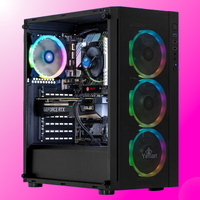AMD promises less fuzziness and flickering from improved FSR 3.1 upscaling algorithm
Better AMD upscaling is coming to Ratchet & Clank, and likely a few more games this year.

AMD has a new version of its FidelityFX Super Resolution upscaling: FSR 3.1. The new and improved upscaling algorithm includes temporal stability improvements, which essentially makes for less of that annoying flickering that could be present on details on previous versions.
Flickering has been a bugbear for FSR. Smaller details, most often at a distance from the player view, flicker in and out as the upscaling algorithm tries to figure out which details to preserve when they're only a few pixels wide. It can be worse in motion, but AMD says that both "at rest and in movement" there's "less flickering and/or shimmering and 'fizziness' around objects in motion.
There are a few comparison shots over in a blog post of Ratchet & Clank with FSR 2.2 and FSR 3.1. The flickering is notably improved with 3.1, and ghosting has been obliterated. Though this isn't a comparison of 3.0 to 3.1, which may prove less pronounced. It's worth noting that some of the detail in the FSR 3.1 image looks to have been obliterated with the temporal improvements, but these tiny gifs aren't the best for comparing anything, really.
AMD has also decided to "decouple" its FSR 3 Frame Generation technology from FSR 3, meaning it's now able to be turned on with other upscaling settings beyond AMD's own. That's a neat decision, following on from Nvidia splitting Frame Gen from DLSS, but since AMD's upscaling tech works on any graphics card, not just its own, it could prove more useful.
For now it's only Ratchet & Clank confirmed as being updated to FSR 3.1. We'll have to see, but Starfield seems like a likely candidate, too. AMD says developers will have access to FSR 3.1 from Q2, which is only a few weeks away, and it "will be coming to games later this year."
Best gaming PC: The top pre-built machines.
Best gaming laptop: Great devices for mobile gaming.
The biggest gaming news, reviews and hardware deals
Keep up to date with the most important stories and the best deals, as picked by the PC Gamer team.

Jacob earned his first byline writing for his own tech blog. From there, he graduated to professionally breaking things as hardware writer at PCGamesN, and would go on to run the team as hardware editor. He joined PC Gamer's top staff as senior hardware editor before becoming managing editor of the hardware team, and you'll now find him reporting on the latest developments in the technology and gaming industries and testing the newest PC components.


